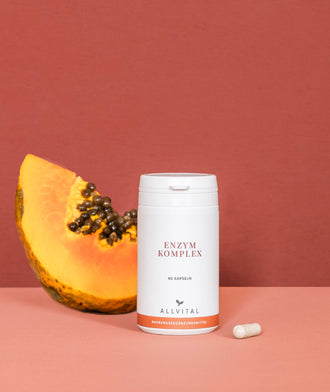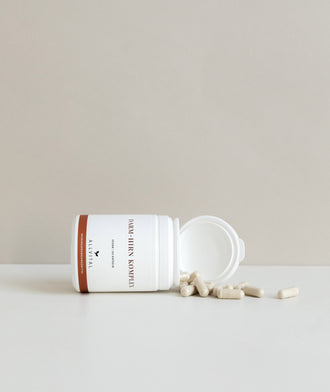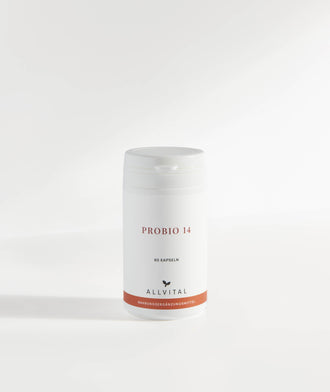
Gut feeling: How the microbiome influences our health
The microbiome is the totality of all micro-organisms such as bacteria, viruses, yeasts and fungi in our organism. This mysterious ecosystem within our body exists in close symbiosis with us and has impressive effects on our...It not only influences our intestinal health, the development of allergies and autoimmune diseases, but also our mental well-being.
In this blog, we present ten fascinating facts about the microbiome that you shouldn't miss!
1. You are more bacteria than human
It may sound amazing, but if we look at the amount of cells in our body, the number of bacteria, viruses, yeasts and fungi actually exceeds the number of human cells. Due to their tiny size, they are barely perceptible to us, yet all the micro-organisms of the microbiome make up around 1.5 kg of our total weight.
2. The microbiome is not only found in the gut
Intestinal flora is often discussed in the context of the microbiome. However, micro-organisms that are part of the microbiome are also found in all parts of our body that are in contact with the outside world, such as the skin, respiratory tract and genital tract. Nevertheless, the intestine harbours the largest number of these microorganisms, which makes the intestinal flora an important factor that influences your health.
3. Your microbiome is as unique as a fingerprint
It is assumed that each person's microbiome consists of about 1,000 different types of bacteria. In terms of total diversity, there are over 10,000 different species in the microbiome. The individual composition of the microbiome is influenced by factors such as genetic predisposition, lifestyle and exposure to micro-organisms, which is why every person's microbiome is unique. Despite this uniqueness, similarities exist within certain groups of people. For example, people who have similar eating habits or live in the same household often have similar micro-organism profiles.
4. The foundation of the microbiome is laid at birth
The composition of the microbiome is already significantly influenced at birth. The difference between a natural birth and a caesarean section has a direct effect on the microbiome. Subsequently, there are many factors that influence the composition of the microbiome, including diet, lifestyle, medication and environmental factors.
5. An imbalance in the microbiome reflects an imbalance in the body
A balanced ratio of intestinal bacteria is essential for our health. A disturbed balance and the predominance of certain microorganisms or a relative lack of necessary bacterial strains can lead to health problems. A lot of research is currently being carried out in this area and more and more diseases are being linked to unfavourable changes in the microbiome. These illnesses include inflammatory bowel diseases, cardiovascular diseases, certain forms of cancer, autoimmune diseases, allergies and neurological disorders such as Parkinson's, Alzheimer's and depression.
6. Part of the immune system develops in the gut
The intestine harbours numerous immune cells, not least because of its enormous surface area, which is even 100 times larger than the surface area of the skin. The gut microbiome therefore plays a decisive role in the development and regulation of our immune system. A balanced microbiome plays a crucial role in identifying invaders and distinguishing between "harmful" and “non-harmful."
7. The composition of the microbiome influences mental health
There is increasing evidence that the microbiome has communication channels with the nervous system and the brain. This complex bidirectional communication is known as the gut-brain axis. Some bacteria are able to produce hormones and neurotransmitters such as serotonin, dopamine and GABA. The composition of the microbiome can therefore have a direct impact on our own well-being, and behavioural disorders are also associated with changes in the microbiome. The gut, and therefore the gut microbiome, is sometimes referred to as our "second brain."
8. You are what you eat
What you eat largely determines the composition of your microbiome. A healthy diet rich in fibre from vegetables, fruit, whole grains, nuts and pulses leads to a healthy composition of the microbiome. Fermented foods such as yoghurt and kefir also contain good strains of bacteria. What you eat therefore not only determines which nutrients you absorb, but also determines the composition of your microbiome and therefore has a major influence on your health.
9. Stress, lack of exercise and medication can have a negative effect on the composition of the microbiome
Unfortunately, we are increasingly exposed to influences that can have a negative impact on our microbiome nowadays. These influences include stress, lack of exercise, smoking, alcohol and medication such as antibiotics, acid blockers, painkillers and antidepressants. The effects of these influences often lead to a reduction in the diversity of bacteria or increased growth of unfavourable bacterial strains. Such a shift in the microbiome profile can increase the risk of obesity, metabolic disorders or autoimmune diseases.
10. Strengthening the microbiome with the help of food supplements
A healthy diet is crucial for a healthy microbiome. However, simple measures such as getting enough sleep, consciously organising meals and chewing thoroughly can also be beneficial. In addition, you can support your microbiome with food supplements. For example, polyunsaturated omega-3 fatty acids help to promote the diversity of the microbiome. They support the integrity of the intestinal wall and can aid in reducing chronic inflammation of the intestinal wall. Probiotics, which contain bacterial strains such as lactobacillus and bifidobacteria cultures, are also beneficial and lead to a better balance of microorganisms in the gut.
Nurture the hidden world in your body
We have already emphasised the importance of a healthy microbiome for your health. Nevertheless, many people unknowingly have an unbalanced microbiome, which can lead to chronic complaints. Therefore, pay careful attention to all these microorganisms in and on your body, as they have a significant influence on your health!
Allvital offers a variety of products that have a positive effect on the microbiome and the gut:
- ProBio 14 contains a combination of 14 natural bacterial cultures such as lactobacillus and bifidobacteria strains, which are also found in foods such as yoghurt, cheese and sauerkraut. It also contains prebiotics such as fructooligosaccharides (FOS) and inulin, which serve as food for the "good" intestinal bacteria.
- DHA (docosahexaenoic acid) and EPA (eicosapentaenoic acid) are essential polyunsaturated fatty acids that belong to the omega-3 fatty acid class. In addition to their numerous health benefits, these fatty acids help to promote the diversity of the microbiome and support the integrity of the intestinal wall.
- Gut-Brain Complex was specifically developed to support the gut-brain axis. Among other things, it contains sodium propionate in the form of propionic acid, which acts as an important source of energy for the intestinal epithelial cells.
- Enzyme Complex contains essential digestive enzymes such as amylase, protease, lactase, lipase and cellulase as well as secondary plant substances and bitter substances from natural sources such as kiwi, pineapple, algae and the yucca palm. This product has been specially developed to promote the digestion of carbohydrates, proteins and fats, which helps to relieve the intestinal mucosa.






